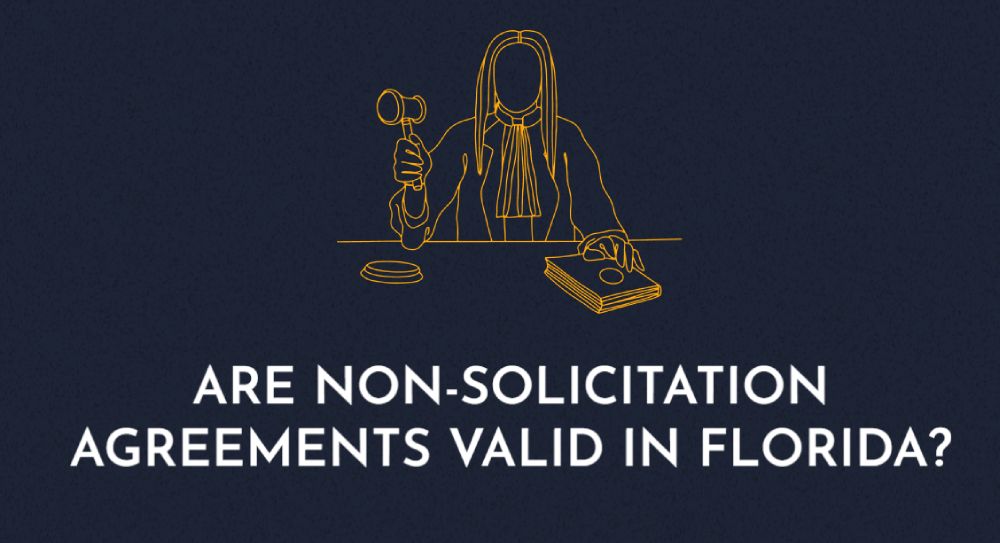
Non-Solicitation agreements are contractual clauses companies sometimes require their employees to sign to protect business interests and foster a competitive business environment. When this happens in Florida, employees often want to know, Are non-solicitation agreements valid?
Employee non-solicitation agreements enforce specific restrictions. They often prohibit former employees from directly recruiting current employees, soliciting current clients, or indirectly engaging through third parties.
In this post, we will explore these criteria and the permissible framework surrounding non-solicitation agreements so that you can make informed employment decisions and protect your job security.
What Is a Non-Solicitation Agreement?
A non-solicitation agreement is a legal contract that prohibits a departing individual, usually a former employee, from actively recruiting a company’s employees or clients for their own benefit or a competitor’s business. This agreement aims to protect the business from losing valuable personnel or customers. It can exist as a separate document or as a clause within an employment or business contract, and typically applies for a specified period after employment ends.
A non-solicitation agreement is a restrictive covenant that prevents an employee from soliciting or doing business with their employer’s clients, employees, or customers for a specific period after the employee’s engagement ends.
Essentially, it is a legal contract between the employer and employee that protects against unfair competition and safeguards confidential information, trade secrets, and customer relationships by preventing employees from using information about the company’s clients, customers, employees, or other business relationships to solicit business after their employment terminates.
Employers often include non-solicitation agreements in employment contracts. An agreement may also be part of a larger or stand-alone contract that includes non-compete, confidentiality, or non-disclosure agreements.
In all cases, the employer must enter the agreement in good faith. This means that the employer cannot impose unreasonable restrictions on employees, stifle competition, or unfairly restrict an employee’s ability to earn a livelihood.
The key elements of non-solicitation agreements typically address the following:
- Scope – The agreement must specify the scope of the restriction, including the specific clients, customers, or employees the clause covers.
- Duration – The agreement must define a fixed period for the restriction.
- Geographic limitations – The agreement must clearly define the restriction’s geographic area or territories.
- Prohibited activities – The agreement should cover specific prohibited activities, such as directly soliciting clients, customers, or employees.
- Consideration – The agreement must provide some type of consideration to the restricted party, for example, something of value in exchange for agreeing to the restrictions, such as continued employment or specialized training.
Employers have every right to try to prevent employees from stealing clients or trade secrets once the employee leaves the company. But employees whose employers ask them to sign non-solicitation agreements may also want to consult an experienced business lawyer to ensure the agreement is drafted correctly and enforceable.
[trustindex no-registration=google]
Are Non-Solicitation Agreements Enforceable in Florida?
Employees subject to specialized employment provisions often want to know, Are non-solicitation agreements enforceable?
In Florida, non-solicitation agreements are enforceable if they protect legitimate business interests, such as trade secrets or customer relationships. The agreement must be reasonable in scope, duration, and geographic area to be valid under Florida law. Under Florida law, this means an employer must show the following:
The Company Must Have a Reasonable Business Interest
The employer must demonstrate that they have a “legitimate business interest” to protect that warrants imposing a restrictive covenant. Legitimate reasons to enforce a non-solicitation agreement include but are not limited to protecting trade secrets or other valuable confidential business or professional information and the goodwill associated with a marketing or trade area. A restrictive covenant not supported by a legitimate business interest is void and unenforceable.
The Agreement Must Include a Reasonable Geographic Area
The ban’s location and geographical scope must be realistic. For example, if the employer’s clients primarily reside within a specific county or region, courts would likely find a non-solicitation agreement restricting the employee from soliciting clients in that area reasonable. In contrast, an agreement prohibiting solicitation throughout the United States would probably be unenforceable.
The Agreement Must Include a Reasonable Duration
Similarly, an employer’s non-solicitation agreement must be for a reasonable duration. The clause cannot permanently ban an employee from doing business, and employers may only enforce it for a realistic amount of time. While there is no bright-line rule, courts in Florida generally find that a reasonable non-solicitation agreement lasts around six months to three years, depending on the circumstances.
The Agreement Must Contain Clear Language
In Florida, a non-solicitation agreement must contain unambiguous language that employees in the specific industry can understand. Courts are more likely to uphold a narrowly-drafted agreement using business terminology tailored to the particular sector than an agreement with broader boilerplate language.
Courts consider a few other factors as well. For example, in JKR Inc. v. Triple Check Tax Service Inc., 736 So. 2d 43 (Fla. Dist. Ct. App. 1999), the court ruled that a non-solicitation agreement that barred a former employee from accepting work from a client who requested the former employee’s services in their new job capacity was unenforceable because it wasn’t considered a solicitation.
Florida law also dissuades non-solicitation agreements from imposing undue hardship on employees and agreements that violate public policy.
Non-solicitation agreements protect Florida businesses from unfair competition and safeguard valuable client relationships and trade secrets. For these reasons, courts generally consider properly drafted agreements that meet the above prongs valid and enforceable.
However, employees should always review any non-solicitation agreement their employers ask them to sign and ensure they fully understand the consequences before undertaking a new position or leaving their current employment.
It is also important to note that laws and legal precedents can change over time, so obtaining the most up-to-date and accurate information about the validity and enforceability of non-solicitation agreements in Florida is essential.
If your employer requires you to sign a non-solicitation agreement, an employment lawyer can help you understand your rights and obligations and ensure you do not unknowingly agree to an overly restrictive contract.
Brenton Legal, PA: Know-How You Can Trust
If you have questions about a non-solicitation agreement, the skilled employment law attorneys at Brenton Legal, PA, can help. Our team prides itself on offering effective employment solutions, professionalism, compassion, and representation you can count on. We will fight for a resolution you can feel good about. Call us 24/7 at 954-639-4644 for a free consultation.

